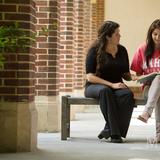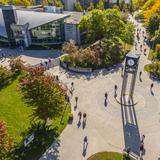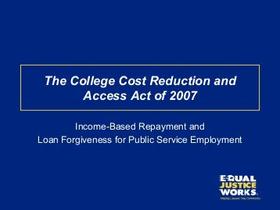- The mission of Mildred Elley is to provide quality career education and technical training to allow students of diverse educational, cultural and personal backgrounds to become successful in an ever-changing global economy. Mildred Elley strives to afford students quality placement opportunities and instill in all of our graduates a desire for lifelong education and learning.
School Highlights
Mildred Elley School-Albany Campus serves 638 students (81% of students are full-time).
The college's student-teacher ratio of 12:1 is lower than the state community college average of 13:1.
Minority enrollment is 75% of the student body (majority Black), which is more than the state average of 62%.
Quick Facts (2025-26)
- Enrollment: 638 students
- Private-state tuition: $11,205
- Acceptance Rate: 89%
- Student-teacher ratio: 12:1
- Minority enrollment: 75%
- Source: Integrated Postsecondary Education Data System (IPEDS)
Top Rankings
Mildred Elley School-Albany Campus ranks among the top 20% of public schools in New York for:
Category
Attribute
Diversity
School Overview
The teacher population of 54 teachers has stayed relatively flat over five years.
Mildred Elley School-Albany Campus
(NY) Community College Avg.
Carnegie Classification
Associate's Colleges: High Career & Technical-High Nontraditional
Baccalaureate/Associate's Colleges: Mixed Baccalaureate/Associate's
Institution Level
At least 2 but less than 4 years
At least 2 but less than 4 years
Institution Control
Private for-profit
Private not-for-profit
Total Faculty
54 staff
159 staff
Student Body
The student population of Mildred Elley School-Albany Campus has grown by 77% over five years.
The student-teacher ratio of 12:1 has increased from 9:1 over five years.
The Mildred Elley School-Albany Campus diversity score of 0.75 is less than the state average of 0.76. The school's diversity has grown by 150% over five years.
Total Enrollment
638 students
1,129 students
Student-Teacher Ratio
12:1
13:1
# Full-Time Students
519 students
528 students
# Part-Time Students
119 students
601 students
# Enrollment Undergraduate
638 students
357 students
# Full-Time Undergraduate Students
519 students
519 students
# Full-Time Graduate Students
n/a
44 students
# Part-Time Undergraduate Students
119 students
850 students
# Part-Time Graduate Students
n/a
41 students
Total Dormitory Capacity
n/a
382 students
% American Indian/Alaskan
1%
n/a
% Asian
1%
8%
% Hispanic
12%
23%
% Black
31%
18%
% White
25%
38%
% Hawaiian
1%
2%
% Two or more races
1%
3%
% Non Resident races
n/a
3%
% Unknown races
28%
5%
Diversity Score
0.75
0.76
College Completion Rate (Students who graduate in less than 4 years)
33%
33%
College Completion Rate (Students who graduate in 4 years or more than 4 years)
n/a
40%
Average Graduate Earnings (10 Years)
$25,100
$35,200
Tuition and Acceptance Rate
The private state tuition of $11,205 is less than the state average of $16,503. The private state tuition has declined by 17% over four years.
Private State Tuition Fees
$11,205
$16,503
% Students Receiving Some Financial Aid
98%
88%
Median Debt for Graduates
$18,583
$13,841
Median Debt for Dropouts
$7,826
$5,500
Acceptance Rate
89%
75%
SAT Reading
n/a
475
SAT Math
n/a
505
SAT Writing
n/a
485
ACT Composite
n/a
20
ACT English
n/a
18
ACT Math
n/a
20
Source: 2024 (or latest year available) Integrated Postsecondary Education Data System (IPEDS) , School Administrators
School Notes
- Mrs. Augusta Mildred founded the school in 1917. Since then, the school has grown, became co-educational, added numerous fields to its course offerings, and became a degree-granting, accredited institution of higher education. In 1985, Faith Ann Takes became President of Mildred Elley School. Under her leadership, the school entered an era of change and growth. In ten years, the enrollment grew from thirty-seven to over five hundred students. In 1985, the school became co-educational. In 1989, an evening division was created and has grown to nearly the size of the day division. In 2002, a weekend division was added. Since January 1997, graduates have been able to earn the Associate in Occupational Studies (A.O.S.) degree. In 1998, Mildred Elley moved into its current location at 800 New Loudon Road in Latham. This modern 21,000 square-foot facility is conveniently located in Latham Circle Mall, close to major access roads in the Capital Region. Our programs offer the most advanced job training available because we know how crucial up-to-date employment skills are to your professional development. We offer Associate's Degree (A.O.S.) and Undergraduate Certificate in Game Design and 3D Animation, Digital Graphics and Multimedia Design, Massage Therapy Degree Program, Business Management Programs, Information Technology Programs, Medical Studies programs, Office Technologies Programs, Paralegal Studies Programs and Travel and Tourism Program. Mildred Elley is accredited by the Accrediting Council for Independent Colleges and Schools (ACICS) to award diplomas, certificates, and the Associate in Occupational Studies (A.O.S.) degree. The Accrediting Council for Independent Colleges and Schools is listed as a nationally recognized accrediting agency by the United States Department of Education. This accreditation is also recognized by the Council for Higher Education Accreditation.
Frequently Asked Questions
How much does Mildred Elley School-Albany Campus cost?
Mildred Elley School-Albany Campus's private state tuition is approximately $11,205.
What schools are Mildred Elley School-Albany Campus often compared to?
Mildred Elley School-Albany Campusis often viewed alongside schools like St. Peter's Hospital College of Nursing by visitors of our site.
What is the acceptance rate of Mildred Elley School-Albany Campus?
The acceptance rate of Mildred Elley School-Albany Campus is 89%, which is higher than the state average of 75%.
What is Mildred Elley School-Albany Campus's ranking?
Mildred Elley School-Albany Campus ranks among the top 20% of community college in New York for: Diversity in US community colleges.
Recent Articles

Community Colleges in 2025: Combating Stereotypes with Impact
Updated insights on how community colleges are dispelling myths, growing enrollment, and expanding pathways in 2025.

2025 FAFSA Changes Explained for Community College Students
A comprehensive guide to 2025 FAFSA changes, what community college students must know, new eligibility rules, timelines, and tips to maximize federal aid.

Mental Health Resources at Community Colleges 2025
A 2025 review of mental health resources at community colleges, covering counseling services, teletherapy, funding trends, and best practices.







